Comprehensive Guide to Garden Maintenance in Purley
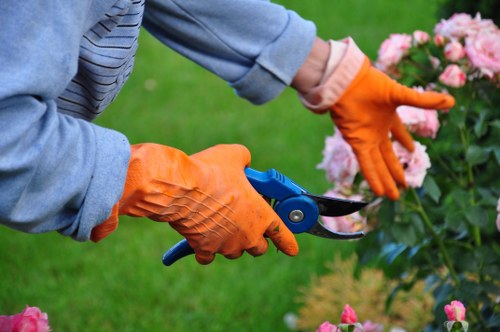
Maintaining a beautiful garden in Purley requires a combination of regular care, expert knowledge, and the right tools. Whether you're a seasoned gardener or a novice, understanding the specific needs of your garden can help you achieve a lush, thriving outdoor space.
Purley's unique climate and soil conditions play a significant role in determining the best practices for garden maintenance. By tailoring your gardening strategies to suit these local factors, you can ensure your plants remain healthy and vibrant throughout the year.
In this comprehensive guide, we'll explore essential garden maintenance tasks, tips for seasonal care, and how to select the right plants for your Purley garden.
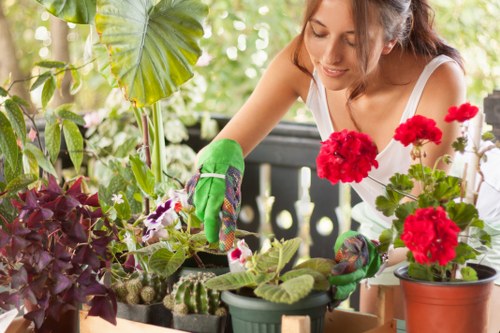
Essential Garden Maintenance Tasks
Regular maintenance is the cornerstone of a successful garden. By staying on top of these essential tasks, you can prevent common issues and promote a healthy growing environment.
1. Lawn Care
- Mowing: Keep your lawn at an optimal height by mowing regularly. This encourages strong root growth and deters weeds.
- Watering: Ensure your lawn receives adequate water, especially during dry spells. Early morning watering is ideal to minimize evaporation.
- Fertilizing: Apply a balanced fertilizer to provide essential nutrients that promote lush, green grass.
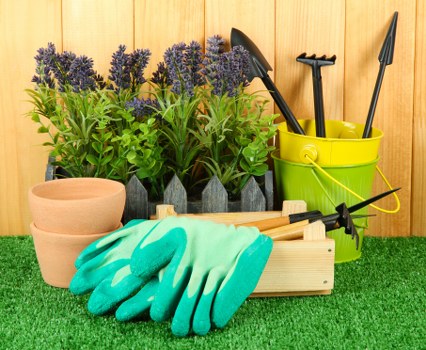
2. Pruning and Trimming
Regular pruning helps maintain the shape and health of your plants. Remove dead or diseased branches to prevent the spread of pests and ensure better air circulation.
3. Weed Control
Weeds compete with your plants for nutrients and water. Implementing an effective weed control strategy, such as mulching or using natural herbicides, can keep your garden looking pristine.
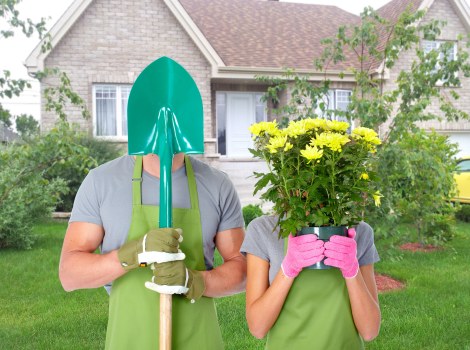
Seasonal Garden Care
Adapting your garden maintenance routine to the changing seasons is crucial for sustained plant health. Each season presents unique challenges and opportunities for your garden.
Spring Maintenance
Spring is a vital time for garden preparation. Start by cleaning up any debris from the winter months and preparing your beds for planting.
- Soil Testing: Assess your soil's health and fertility. Amend the soil as needed to provide a strong foundation for your plants.
- Planting: Choose spring-appropriate plants that thrive in Purley's climate. Early planting can give your garden a head start for the growing season.
- Mulching: Apply mulch to retain moisture, suppress weeds, and regulate soil temperature.
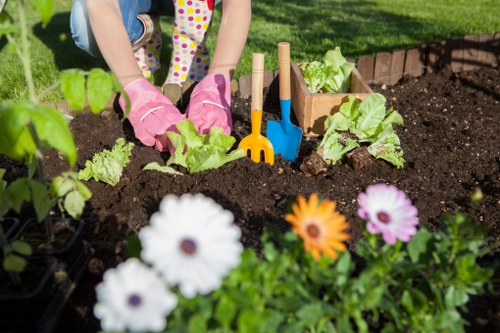
Summer Maintenance
Summer demands diligent care to manage heat and moisture levels. Proper watering and pest management are essential during this season.
Watering: Ensure consistent watering, especially during dry periods. Drip irrigation systems can provide efficient and targeted hydration.
Pest Control: Monitor your plants for signs of pests and diseases. Implement natural or chemical treatments as necessary to protect your garden.
Autumn Maintenance
Autumn is a time for preparation and cleanup. As temperatures drop, focus on protecting your garden from the upcoming winter.
- Leaf Removal: Clear fallen leaves to prevent mold growth and maintain garden aesthetics.
- Planting Bulbs: Autumn is ideal for planting spring-flowering bulbs, ensuring vibrant blooms in the coming year.
- Soil Preparation: Enrich the soil with compost or manure to improve its structure and nutrient content.
Winter Maintenance
Winter requires minimal yet essential care to ensure your garden withstands the colder months.
Protecting Plants: Use covers or mulch to shield sensitive plants from frost and extreme temperatures.
Pruning: Perform any necessary pruning while plants are dormant to encourage healthy growth in spring.
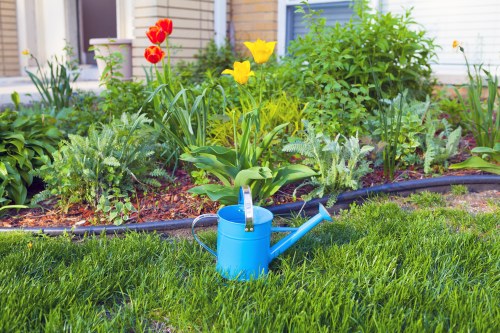
Choosing the Right Plants for Purley Gardens
Selecting plants suited to Purley's climate and soil conditions can significantly reduce maintenance efforts and enhance garden beauty.
Perennials
Perennials are an excellent choice for low-maintenance gardens. They return year after year, providing consistent color and structure.
- Lavender: Known for its fragrant blooms and drought resistance.
- Hostas: Ideal for shaded areas, offering lush foliage and delicate flowers.
- Daylilies: Easy to grow and highly adaptable to various soil types.
Annuals
Annuals provide seasonal color and can be swapped out each year to keep your garden fresh and vibrant.
Consider plants like marigolds, petunias, and zinnias for bright, lasting blooms throughout the summer.
Native Plants
Incorporating native plants can promote local biodiversity and require less water and maintenance.
- Bluebells: Stunning spring flowers that thrive in Purley's climate.
- Heather: Evergreen plants that provide year-round interest.
- Rhododendrons: Large, showy flowers that add structure to your garden.
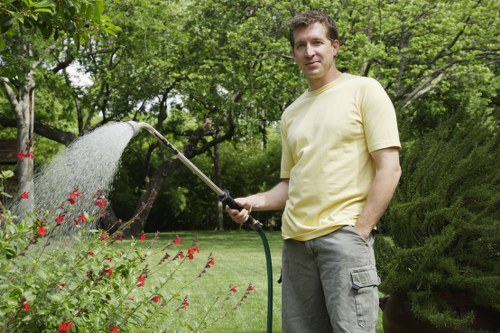
Tools and Equipment for Effective Garden Maintenance
Having the right tools can make garden maintenance more efficient and enjoyable. Invest in high-quality equipment to ensure your garden stays in top condition.
Essential Tools
- Pruning Shears: For precise trimming of branches and stems.
- Garden Fork: Ideal for loosening soil and aerating beds.
- Hose with Adjustable Nozzle: Provides flexible watering options.
Advanced Equipment
For larger gardens, consider investing in advanced tools to streamline maintenance tasks.
- Lawn Mower: Keeps your grass neatly trimmed and healthy.
- Leaf Blower: Efficiently clears leaves and debris from your garden.
- Composter: Recycles garden waste into valuable compost for your plants.
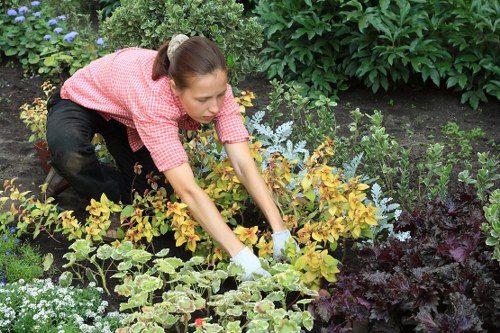
Professional Garden Maintenance Services in Purley
While DIY garden maintenance can be rewarding, professional services offer expertise and convenience, ensuring your garden remains pristine with minimal effort.
Benefits of Hiring Professionals
- Expert Knowledge: Professionals understand the specific needs of Purley's climate and soil.
- Time-Saving: Outsourcing maintenance tasks frees up your schedule for other activities.
- Comprehensive Care: From regular mowing to intricate pruning, professionals handle all aspects of garden upkeep.
By partnering with a reputable garden maintenance service in Purley, you can enjoy a beautiful outdoor space year-round without the hassle.
Choosing the Right Service
When selecting a garden maintenance provider, consider the following factors:
- Experience: Look for companies with a proven track record in Purley.
- Services Offered: Ensure they provide the specific maintenance tasks you need.
- Customer Reviews: Positive feedback indicates reliable and high-quality service.
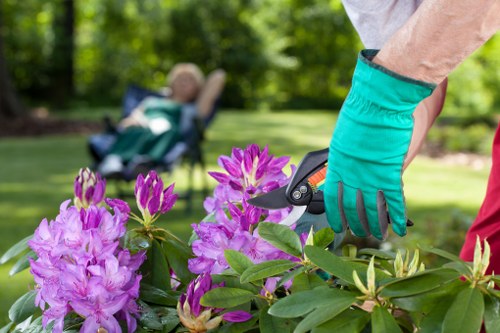
Sustainable Garden Practices
Adopting sustainable practices not only benefits the environment but also enhances the resilience and beauty of your garden.
Water Conservation
Implementing water-saving techniques helps maintain your garden during dry periods and reduces your environmental footprint.
- Drip Irrigation: Provides targeted watering to the roots, minimizing waste.
- Rainwater Harvesting: Collects and stores rainwater for later use.
- Mulching: Retains soil moisture and reduces the need for frequent watering.
Organic Gardening
Using organic methods promotes soil health and reduces reliance on chemical fertilizers and pesticides.
Composting: Turns kitchen and garden waste into nutrient-rich compost for your plants.
Natural Pest Control: Encourages beneficial insects and uses organic treatments to manage pests.
Biodiversity
A diverse garden supports a variety of plant and animal life, creating a balanced and resilient ecosystem.
- Native Plants: Attract local wildlife and require less maintenance.
- Pollinator Gardens: Provide food and habitat for bees, butterflies, and other pollinators.
- Water Features: Support amphibians and attract beneficial birds.
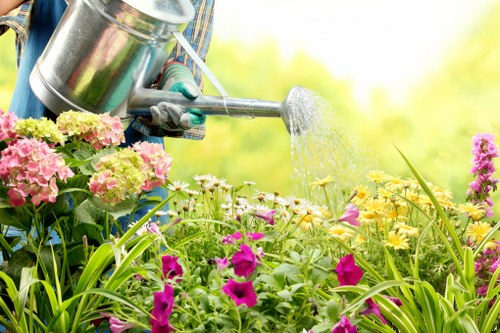
Common Garden Problems and Solutions
Every garden faces challenges, but with the right knowledge, you can effectively address and prevent common issues.
Pest Infestations
Pests can damage your plants and disrupt the garden's balance. Regular monitoring and integrated pest management can keep infestations under control.
- Identification: Correctly identify pests to choose the most effective treatment.
- Natural Predators: Encourage beneficial insects like ladybugs and lacewings to reduce pest populations.
- Organic Treatments: Use neem oil, insecticidal soap, or other natural solutions to manage pests without harming the environment.
Disease Control
Plant diseases can spread quickly if not addressed promptly. Implementing good hygiene practices and selecting disease-resistant varieties can mitigate these risks.
Soil Issues
Healthy soil is the foundation of a thriving garden. Test your soil's pH and nutrient levels regularly, and amend it as needed to support robust plant growth.
- Amending Soil: Add compost, manure, or other organic matter to improve soil structure.
- pH Adjustment: Use lime to raise pH or sulfur to lower pH, depending on your plants' needs.
- Drainage: Ensure proper drainage to prevent root rot and other water-related issues.
Enhancing Your Purley Garden with Landscaping Features
Incorporating various landscaping elements can add functionality and aesthetic appeal to your garden.
Pathways and Walkways
Well-designed paths guide visitors through your garden and protect plant beds from foot traffic.
- Materials: Choose from gravel, stone, wood, or concrete based on your garden's style.
- Design: Curved paths create a more natural and inviting feel compared to straight lines.
- Lighting: Integrate lighting into your paths for safety and ambiance during evening hours.
Garden Structures
Adding structures like pergolas, arbors, or gazebos provides shade, support climbing plants, and creates focal points.
Water Features
Water elements such as fountains, ponds, or birdbaths enhance the tranquility of your garden and attract wildlife.
- Fountains: Offer the soothing sound of flowing water.
- Ponds: Create habitats for fish and amphibians.
- Birdbaths: Provide a water source for birds, encouraging them to visit your garden.
Preparing Your Garden for Special Occasions
Whether hosting a summer party or celebrating the holidays, preparing your garden for special occasions ensures a stunning display that impresses your guests.
Seasonal Decorations
Incorporate seasonal plants and decorations to align with the theme of your event.
- Spring: Utilize vibrant tulips, daffodils, and cherry blossoms.
- Summer: Feature lush greenery and bright annuals like petunias and marigolds.
- Autumn: Embrace warm hues with chrysanthemums, asters, and decorative pumpkins.
- Winter: Add evergreen plants, holiday lights, and festive ornaments.
Lighting
Proper lighting can transform your garden for evening events, highlighting key features and creating a magical atmosphere.
- String Lights: Drape them across trees or pergolas for a whimsical touch.
- Spotlights: Illuminate focal points like statues or water features.
- Solar Lights: Eco-friendly options that charge during the day and illuminate at night.
Seating and Layout
Arrange seating areas to facilitate conversation and enjoyment of your garden's beauty.
Furniture: Choose comfortable and weather-resistant furniture that complements your garden's style.
Layout: Plan the arrangement to ensure easy movement and accessibility for your guests.
DIY Garden Maintenance Tips
While professional services are invaluable, there are several maintenance tasks you can handle yourself to keep your garden in excellent condition.
Regular Inspection
Frequently check your plants for signs of stress, pests, or disease. Early detection allows for prompt treatment and minimizes damage.
Mulching Techniques
Apply a layer of mulch around your plants to conserve moisture, suppress weeds, and regulate soil temperature.
- Organic Mulch: Use materials like wood chips, straw, or compost, which enrich the soil as they decompose.
- Inorganic Mulch: Options like gravel or rubber mulch offer long-lasting weed suppression without adding nutrients.
Composting at Home
Create your own compost to recycle kitchen and garden waste, providing a sustainable source of nutrients for your plants.
- Setup: Choose a compost bin or designate a composting area in your garden.
- Materials: Combine green materials (kitchen scraps, grass clippings) with brown materials (leaves, branches).
- Maintenance: Turn the compost regularly to aerate and speed up the decomposition process.
Plant Propagation
Expand your garden by propagating plants through methods like cuttings, layering, or division.
- Cuttings: Take stem or leaf cuttings and root them in water or soil.
- Layering: Encourage roots to form on stems while they are still attached to the parent plant.
- Division: Split larger plants into smaller sections to create new plants.
Maintaining Garden Health and Aesthetics
Balancing plant health with aesthetic appeal creates a harmonious and inviting garden space.
Plant Selection and Arrangement
Choose plants with varying heights, colors, and textures to add depth and interest to your garden.
- Height Variation: Combine tall shrubs with mid-sized plants and ground covers.
- Color Schemes: Select complementary colors to create a visually pleasing palette.
- Texture: Incorporate plants with different leaf shapes and surface textures for added dimension.
Healthy Soil Practices
Maintaining healthy soil is essential for robust plant growth and disease prevention.
- Regular Aeration: Loosen compacted soil to improve root penetration and nutrient absorption.
- Organic Amendments: Continuously add compost or other organic matter to keep the soil fertile.
- Crop Rotation: Vary plant types in different garden areas to prevent soil depletion and reduce pest buildup.
Integrated Pest Management (IPM)
Adopt IPM strategies to control pests sustainably and effectively.
- Biological Control: Use natural predators to manage pest populations.
- Cultural Practices: Adjust planting times and methods to reduce pest attraction.
- Chemical Controls: Apply pesticides judiciously and opt for eco-friendly options when necessary.
Regular Cleaning and Debris Removal
Keeping your garden clean prevents the buildup of organic debris that can harbor pests and diseases.
- Deadheading: Remove spent flowers to encourage new blooms and maintain plant health.
- Leaf Removal: Clear fallen leaves and plant material regularly.
- Tool Maintenance: Clean and store garden tools properly to extend their lifespan and prevent contamination.
Conclusion and Call-to-Action
Effective garden maintenance in Purley involves a blend of regular care, informed decision-making, and, when needed, professional assistance. By following the guidelines outlined in this article, you can cultivate a stunning and healthy garden that enhances your outdoor living space.
Whether you're tackling maintenance tasks yourself or seeking expert services, remember that a well-maintained garden is a rewarding investment that brings joy and relaxation year-round.
Ready to transform your Purley garden? Contact us today to schedule your garden maintenance service and enjoy a beautiful, thriving outdoor space!